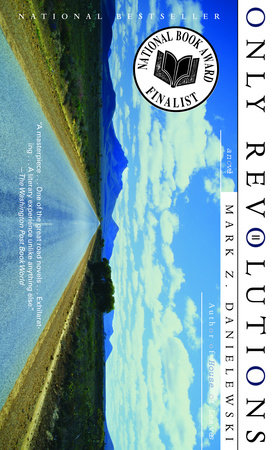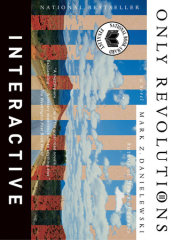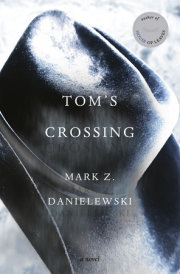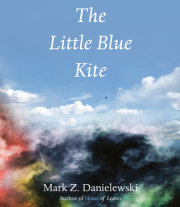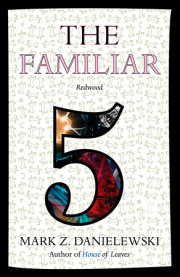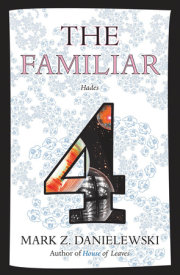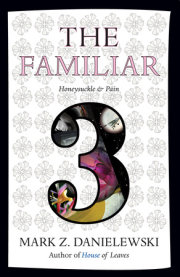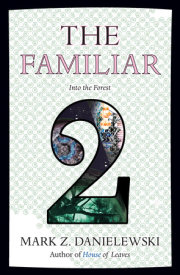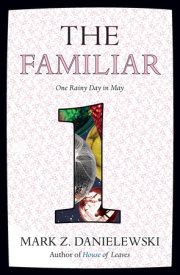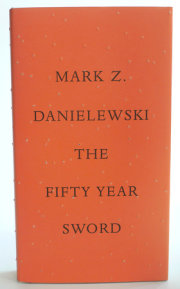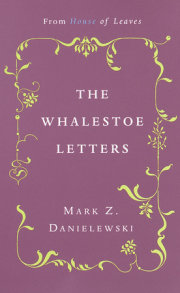Finalist for the National Book Award
Sam:
They were with us before Romeo & Juliet. And long after too. Because they’re forever around. Or so both claim, carolling gleefully:
We’re allways sixteen.
Sam & Hailey, powered by an ever-rotating fleet of cars, from Model T to Lincoln Continental, career from the Civil War to the Cold War, barrelling down through the Appalachians, up the Mississippi River, across the Badlands, finally cutting a nation in half as they try to outrace History itself.
By turns beguiling and gripping, finally worldwrecking, Only Revolutions is unlike anything ever published before, a remarkable feat of heart and intellect, moving us with the journey of two kids, perpetually of summer, perpetually sixteen, who give up everything except each other.
Hailey:
They were with us before Tristan & Isolde. And long after too. Because they’re forever around. Or so both claim, gleefully carolling:
We’re allways sixteen.
Hailey & Sam, powered by an ever-rotating fleet of cars, from Shelby Mustang to Sumover Linx, careen from the Civil Rights Movement to the Iraq War, tearing down to New Orleans, up the Mississippi River, across Montana, finally cutting a nation in half as they try to outrace History itself.
By turns enticing and exhilarating, finally breathtaking, Only Revolutions is unlike anything ever conceived before, a remarkable feat of heart and intellect, moving us with the journey of two kids, perpetually of summer, perpetually sixteen, who give up everything except each other.
“Inventive. . . . A complex, challenging novel that leaves the head spinning. . . .One of the great road novels. . . . It needs to be studied, its patterns and symbolism deciphered, its historical cross-references pondered. . . . Sam and Hailey are not simply characters but transhistorical archetypes. . . . Only Revolutions is a masterpiece of formal design. . . . . It's an exhilarating trip, a literary experience unlike anything else piled up in book stores. Only revolutions against the conventional novel like this one keep the genre truly novel.” —The Washington Post
“Danielewski tells his story through a kaleidoscope, turning it so that each piece of prose catches the light. . . . The rewards of Danielewski's dive into history are manifold, bringing together mind-bending syntax, the coltish excitement of adventure and a bittersweet love story saturated in American mythos. . . . The towering achievement in "Only Revolutions" comes in Danielewski's provocative, mischievous and thoroughly dazzling writing. . . . He smashes, pushes, copies, tears and juggles words in combinations unanticipated and inspired, providing so much pace and beauty to the story that the book screams to be read aloud. . . . Those patterns, tossing together internal and external rhyme, punning and funning, give the novel a breakneck velocity. . . . In Danielewski's heartbreakingly gorgeous vision, history doesn't evolve; instead, like so many wheels on so many cars, it only revolves.” —San Francisco Chronicle
“[A]bstruse and ambitious, undeniably astonishing and contemporary. . . . Its elegant mysteries are instead contained in the poetic language and forms embraces by the narrators: The more the novel’s structure is decoded, the more lyrical and poignant it becomes.” —Stefanie Sobelle, Bookforum
"The daunting maze explored in Danielewski’s Borgesian first novel, House of Leaves (2000), only hinted at the depths to be plumbed in its intimidatingly innovative successor. It’s a love story, road novel and paean to untrammeled freedom, presented in dual free-verse narratives spoken by Sam and Hailey, two 16-year-old vagabonds who embark on a mythic and allegorical journey across America, in a succession of variously acquired automobiles, during an expanding time period that stretches from the American Civil War to the immediate present. Rebels and malcontents, they repeatedly indulge in Whitmanesque, Rabelaisian arias (“I’m The World which / The Mountain descends from and / I laugh because it tickles”), while proclaiming their allegiance to nothing but each other (“Liberty and Love are one”), and eluding or battling characters emblematic of entrenched interests, convention and complacency (e.g., “Mad Robber Barons,” “Hoovercrats”). The publisher helpfully suggests reading eight pages of Sam’s story, then flipping the volume upside-down and reversing it, for eight pages in Hailey’s voice, until the two narratives meet in the middle of the book. Further complications arise from chronological enumerations of historical events on each page’s margins and versified comments on every page presented, upside-down, at the bottom of said page. Self-indulgence? Surely. But there’s a real story here, and a persuasive sense that the couple’s wild ride is a kind of creation myth that mirrors, as it presumes to explain, America’s unruly energies --- as Sam and Hailey experience Hailey’s brief dalliance with a macho avatar of military, militant power (“The Creep”), an Ongoing Party in New Orleans, a farcical hospital stay following an apparent overdose and an escape to the heartland and a climactic encounter with “the peril pursuing US.” They’re Bonnie and Clyde, Tristan and Isolde, an X-rated Archie and Veronica and perhaps All in the Family’s embattled liberal couple Mike and Gloria." —Kirkus Reviews
“Sweeping ambition and fierce intelligence. . . . A quintessential novel of our time, embodying, as it does, art / technology / literature / design and the spirit of experimentation.” —Los Angeles Times
“It’s difficult to decide whether Danielewski is merely reinventing the novel as a medium, or has constructed his own, entirely original platform from which to destroy literary convention.” —The New York Press
“Engaging. . . . Reads like a love story slipped into a particle accelerator.” —Time Out New York
“Poetic. . . . Elegant. . . . Poignant. . . . Danielewski’s second major novel . . . might just be his Finnegans Wake: abstruse and ambitious, undeniably astonishing and contemporary.” —Bookforum
“A lot is expected of Danielewski as a novelist who forgoes conventions, and he certainly delivers in his latest effort.” —San Francisco Chronicle
“Falls along the literary spectrum somewhere between the narrative of Adam and Eve in Paradise Lost and Quentin Tarantino’ s screenplay for Natural Born Killers. . . . Recall[s] James Joyce. . . . Harks back to William Faulkner’s The Sound and the Fury.” —The Oregonian
“Ambitious, meticulous, and original, Danielewski continues to survey the frontiers of the novel. . . . The book hurtles you straight onto the road and into the split-screen vortex of the folie à deux of its couple.” —Los Angeles City Beat
“In his new novel, the author of House of Leaves is up to his old tricks–multicolored and upside-down text–and some flabbergasting new ones, including a double-ended structure that obliges the reader to flip the book every eight pages.” —The New Yorker
“Danielewski’s formidable literary intelligence . . . has here composed a startling and versatile pair of voices, and a manner of storytelling which is at once hallucinatory . . . slyly punning, and also possessed finally of an authentically tragic register. . . . The book is to be admired for its sheer zest for invention, the kind of faith in ambitious literature so rare among contemporary novelists. . . . Once you are attuned to its extraordinary music, there is no way out except through the end.” —The Guardian
“A spectacular production. . . . Does more than most to extend the boundaries of printed text.” —The Daily Telegraph
“This creative paean to the velocity of young lovers and the vibrancy of American culture is sure to wow.” —Booklist
“[A] impressive tour de force. . . . A pastiche of Joyce and Beckett with heapings of Derrida’s Glas and Thomas Pynchon’ s The Crying of Lot 49.” —Publishers Weekly
“Rare and to-be-treasured. . . . The book is a hall of mirrors, an immaculately constructed maze, a puzzle wrapped in an enigma concealing a mystery. . . . A style that recalls e e cummings and Finnegans Wake in equal measure, with a dash of Kerouac's On the Road. . . . On my three readings, it has made me cry and laugh. It has flummoxed me and given me insights. It has even managed to be genuinely erotic, and has rejoiced (re-Joyce-ed?) in the most tender descriptions of first loves. . . . Hailey and Sam are the opposite of terror, yet terror stalks them. As they flee the forces of oppression, and as their favorite words start ebbing, they persist with a naïve joy, and mature into an awful realization that love might be only calibrated by its own loss. The American Dream, in a fissile, fractured way, is their nightmare, and their possible redemption.” —Stuart Kelly, Scotland on Sunday
“An astounding work, a mind-boggling epic poem one would expect if Pynchon, Benet, Homer and Joyce were miraculously smashed together into one brilliant writer. It will leave you confused, absorbed, drained, enthralled and wanting to go through it all again. It is a journey and you, as a reader, are a participant.” —Bookreporter.com
“Turning readers upside-down . . . Mark Z. Danielewski wants you to try harder. . . . [Only Revolutions] is the road novel as if imagined by John Cage. . . . A true revolution–it wants to overthrow not just how we read, but what we read.” —Newsday
“The fall's most inventive novel.” —Bloomberg News
“Innovative. . . . A love story, road novel and paean to untrammeled freedom, presented in dual free-verse narratives spoken by Sam and Hailey. . . . They're Bonnie and Clyde, Tristan and Isolde, an X-rated Archie and Veronica and perhaps All in the Family’s embattled liberal couple Mike and Gloria. . . . You have to work at it, but it's a trip well worth taking.” —Kirkus Reviews (starred review)

